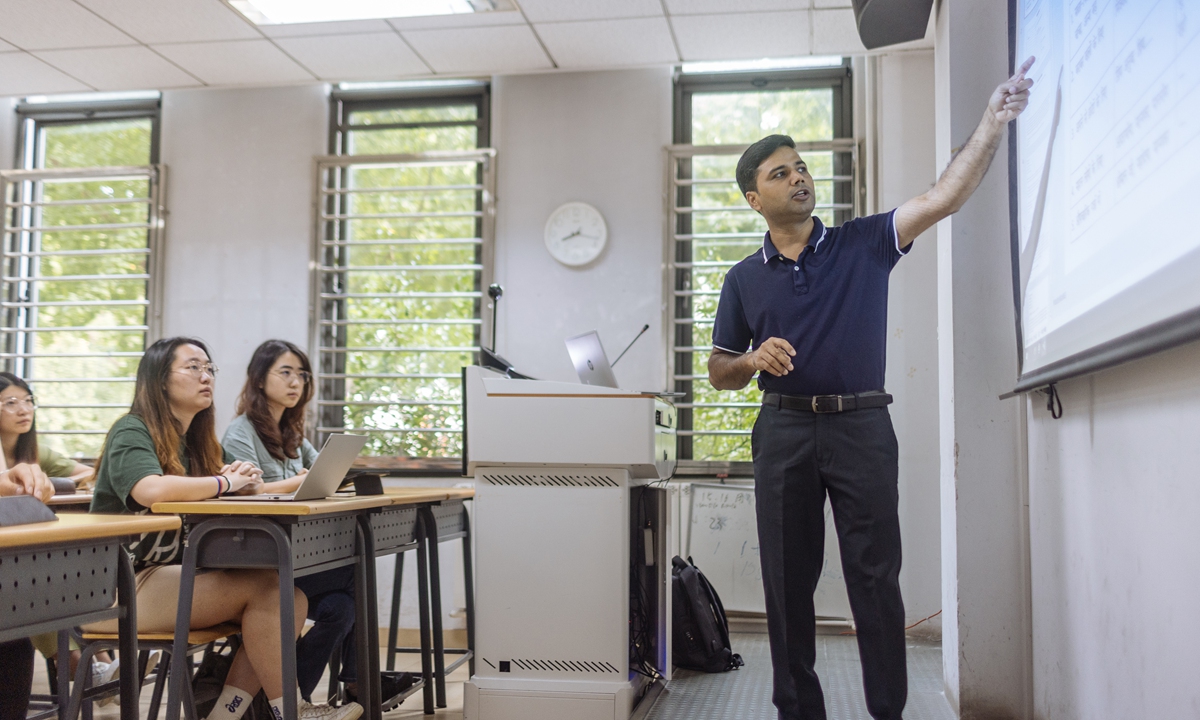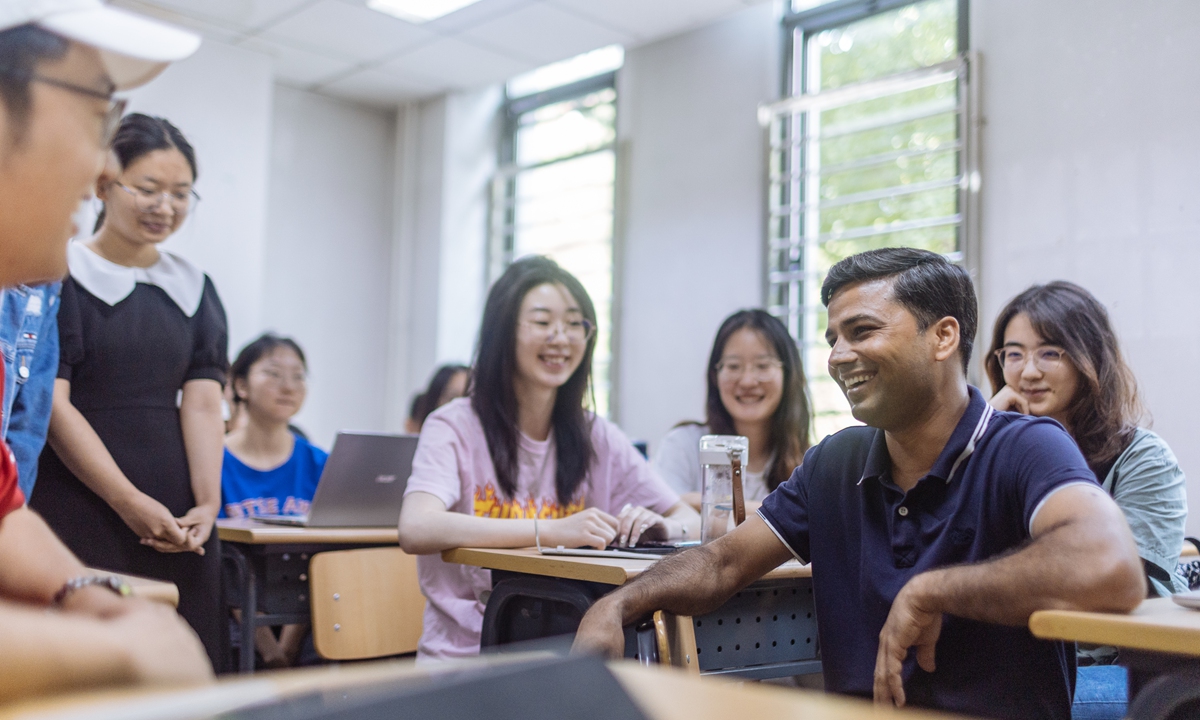Indian expat recalls China's remarkable growth over last decade, calls for more people-to-people exchanges
Foreign face, Chinese spirit
Editor's Note:
China's modernization has been an epic journey over the last decade. Under the leadership of the Communist Party of China (CPC), China has become an attractive destination for many foreigners. Many such expats in the country have fulfilled their career aspirations, while some have found love and started families in China.
Why do they choose to live in China? How do expats in China view and interpret China's achievements and persistence measured from various perspectives? The Global Times interviewed multiple international residents in China from all walks of life, some of whom have made tangible contributions to China's development, to learn about their understanding of the essence of Chinese culture, and gain an insight into how far China has advanced in its pursuit of development and rejuvenation over the last decade.

Vikash Kumar Singh teaches Hindi at the Beijing Foreign Studies University on September 15, 2022. Photo: Li Hao/GT
Peppering his perfect mandarin with the occasional slang word and riding an electric scooter commonly used in China, 40-year-old Vikash Kumar Singh from India has a foreign face but is a genuine Beijinger at heart.
Singh gave himself the Chinese name "Wei Han," as an homage to the inclusiveness represented by the culture of China's Wei, Jin, and Han dynasties. Wei told the Global Times that he loves Chinese culture and is eager to learn about everything related to the Chinese civilization, especially the folk customs that were at its core throughout history.
Having lived in Beijing for 15 years, Singh has witnessed the booming development of not just Beijing, but the entire country, under the leadership of the Communist Party of China (CPC).
Cultural envoy
After graduating from Jawaharlal Nehru University in India, with a sparked curiosity and admiration for Chinese culture, Singh came to China in 2007 to study Chinese at the Renmin University of China on a scholarship. He then joined Beijing Foreign Studies University in 2018 as a foreign Hindi language teacher.
However, Singh's start as a professional cultural exchange messenger between China and India started with Singh's translation of Qinqiang, a critically acclaimed novel by famous Chinese author Jia Pingwa, an endeavor that lasted for almost two years.
As part of a Chinese and Indian literature translation and publication program supported by both governments, Singh thought that the translation of literary works like Qinqiang into languages spoken in India would be a cultural window into understanding China.
To make the translation more accurate, Singh asked his Chinese friend from Northwest China's Shaanxi Province to proofread the Shaanxi dialect used in the novel. In addition, in order to reflect the local characteristics of the novel, he also translated some expressions into dialects found in northern India for the text to resonate with more Indian readers.
In the 1950s and 1960s, numerous Indian-authored literary works were translated into Chinese, but the reverse was rare. Some of the works are even translated from other languages (such as English), which entirely miss the original context. The people of India should learn more about China by learning more about the original Chinese language and the Chinese way of life, Singh told the Global Times.
Learning a language is still the most important way to understand a country and a culture. It is easy to develop misconceptions about China if you do not speak the language, he noted.
"Nowadays, because of the growing relationship between India and China, especially economic relations through a trade relationship between the two countries, Chinese students are more attracted by the Hindi language, Hindu culture, and Indian society. It is similar in India where there has been a growing interest in the Chinese language, Chinese diplomacy, and many other subjects over the last decade," Singh told the Global Times.
Though there have been tensions between India and China in recent years which negatively impacted relations, we can still see a group of people like us trying to be cultural ambassadors, to bridge conflicts and promote understanding through different channels, to actively promote friendship between the two countries, said Singh. "China and India need a stable relationship, as we share many similarities and a close connection."
Vikash Kumar Singh teaches Hindi at the Beijing Foreign Studies University on September 15, 2022. Photo: Li Hao/GT
Exceptional transformations
For Singh, China has experienced remarkable transformations and leapfrog development in the last decade. He has witnessed how China has made great strides in different spheres from space exploration, scientific and technological innovation to infrastructure development, and even feels happy of such speedy growth as an expat living in China.
How China built the world's largest 5G network, largest high-speed railway system, largest expressway network, and largest online retail market is highly remarkable to Singh.
"Since I came to Beijing in 2007, there have been tremendous changes. The number of subway lines has expanded from three to more than 20. We also have special lanes for buses, making bus commutes quicker than other forms of transport during rush hour. And bullet trains can take you from Beijing to Shanghai in only five hours. Municipal planning such as the public transportation system in Beijing is more scientific than in many developed countries," said Singh.
With a total length of 1,318 km and linking the capital with the eastern coastal economic hub of Shanghai, the Beijing-Shanghai high-speed railway is the world's longest high-speed railway line ever constructed in a single phase, the Xinhua News Agency reported.
Moreover, Singh applauded China's efforts in air pollution control through its three-year action plan to counter air pollution, efforts that turned the capital city from a fog-covered city to having clear blue skies.
When talking about the biggest changes in China over the last decade with his Indian friends, Singh usually underlines the fact that China's burgeoning digital economy has revolutionized the lives of urbanites with emerging technologies.
"China's development of internet infrastructure and a booming digital economy pioneered a change in the modes of payment in the world. My Indian friends can't even believe how in China someone can go out with only a mobile phone and take care of all their needs," Singh said.
Singh has traveled to many rural areas in China and has seen how China's experience in poverty alleviation and rural governance has brought tangible benefits to farmers over the last decade.
Married to a Chinese woman, Singh's family life is a typical amalgamation of Chinese and Indian cultures. He particularly appreciates the respect and freedom that Chinese women enjoy, especially when it comes to choosing majors and careers without having to surmount many taboos and regulations that Indian women face.
"If India wants to develop and become a powerful country, then Indians should first learn from China on how to empower their women and girls, and provide them with free education, as well as every kind of opportunity," he noted.
Chinese people are connected to their core cultural traditions and moral values, which, for example, can be reflected in their respect for the elderly. This is the unchanging essence of Chinese culture, Singh stressed, adding that he looks forward to the resumption of people-to-people exchanges between China and India in the post-pandemic era.
